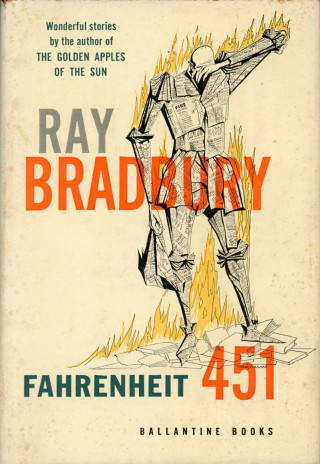“I walked into his room.” Bradbury recalled. “He put a drink in my hand. He sat me down and he leaned over and said, ‘Ray, what are you doing during the next year?’” When Bradbury imitated Huston, he assumed a rough, throaty baritone.
I said, “Not much, Mr. Huston. Not much.” And he said, “Well, Ray, how would you like to come live in Ireland and write the screenplay of Moby Dick?” And I said, “Gee, Mr. Huston, I’ve never been able to read the damn thing.”
He’d never heard that before and he thought for a moment and then he said, “Well, I’ll tell you what, Ray. Why don’t you go [home] tonight, read as much as you can, and come back tomorrow and then tell me if you’ll help me kill a white whale.”
Bradbury was stunned. He went home and told his wife, “Pray for me.” Maggie Bradbury, accustomed to her husband’s hyperbole, responded, “Why?” And he said: “Because I’ve got to read a book tonight and do a book report tomorrow.”
He burned the midnight oil, attempting to devour as much of the notoriously formidable novel as he could. There was no way to read Moby-Dick from start to finish in one night, so he leapfrogged through it, diving into the middle, skipping to a chapter here, a section there, taking it all in—the characters, the metaphors, the Shakespearean drama, the biblical allusions.
The next day, Bradbury agreed to write the screenplay. It had been quite a run. In just over a week, he had finished Fahrenheit 451 and agreed to work with his movie hero, adapting one of the most challenging works of American literature into a two-hour film. Bradbury signed a 17-week contract earning $650 a week plus living expenses, a king’s ransom for a man who, less than a decade earlier, had earned his stripes writing for pulp magazines that paid $40 or $50 per story.
Some in Hollywood were taken aback by Huston’s screenwriting choice to bring Melville to the big screen. After all, to adapt a profoundly complex literary novel, he had given the nod to a man known for writing science fiction. Perhaps no one was more surprised by Huston’s choice than Bradbury himself. Huston had read the most recent book Bradbury had sent him, The Golden Apples of the Sun, and the lead story was all it took.
“The Fog Horn” is a tale about two lighthouse keepers who, late one November night, are paid a visit by a beast that has surfaced from the depths after hearing the lonely call of the lighthouse’s foghorn. Bradbury’s love of dinosaurs had led him to write the story, and it was this love that led Huston to believe he was the right man to adapt Moby-Dick. In reading “The Fog Horn,” Huston stated in his 1980 autobiography An Open Book, he “saw something of Melville’s elusive quality.”

